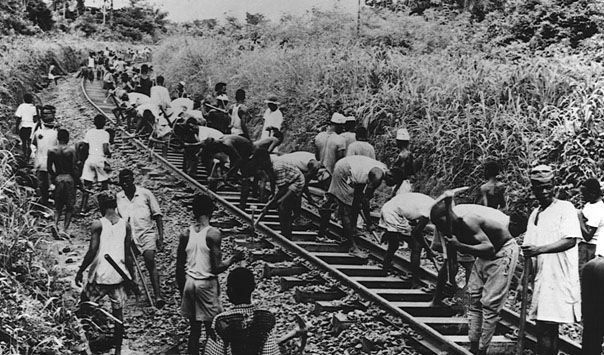Nigeria Pays Off Its Big Debt, Sign of an Economic Rebound
By
LYDIA POLGREEN
Published: April 22, 2006
DAKAR, Senegal, April 21 —
Nigeria said Friday that it had paid the last of its multibillion-dollar debt to the Paris Club of creditor nations.
"Nigeria will not owe anybody in the Paris Club one kobo," President
Olusegun Obasanjo said in a statement earlier this week, referring to a Nigerian unit of currency much like the penny.
Nigeria reached a deal last October with the Paris Club, which includes the United States, Germany, France and other wealthy nations, that allowed it to pay off about $30 billion in accumulated debt for about $12 billion, an overall discount of about 60 percent.
The government said it paid a final installment of $4.5 billion on Friday, Reuters reported. It plans to use the money it saves to develop the country and reduce poverty.
Nigeria committed to using foreign reserves, salted away as oil prices soared, to cancel its debt, which had been racked up during decades of military rule.
The repayment is the latest sign that Nigeria's economy, long hobbled by corruption and dominated by a single product — oil — is on the rebound. The banking sector, which was crowded with small banks of questionable reliability, was recently consolidated to form about two dozen banks with stronger capitalization.
Earlier this year, two credit-rating agencies rated Nigeria's credit as BB-, which is below investment grade but puts it on a par with developing nations like Turkey, Ukraine and Brazil.
Debt relief has become a central issue in the fight against poverty. Nigeria, which owed about $36 billion in overall debt, is one of the most indebted nations in the world. With a population of about 130 million, it has more impoverished citizens than any other African nation; per capita gross domestic product stands at roughly $1,000 a year.
Yet Nigeria had not been among the nations that have received write-offs or discounts on their debts, as several poor countries have. In part that is because of its reputation for corruption, earned by a succession of military governments that plundered the state treasury, and because Nigeria, with its oil wealth, is seen as being able to pay.
Groups that have campaigned for debt cancellation said that the debt Nigeria owed was accumulated under military rulers, and that the current Nigerian government, which was democratically elected and has made fighting corruption a priority, should not be forced to pay. But Nigeria's debt was largely accumulated under civilian governments, and left unpaid by military rulers.
Nigeria's vast oil reserves make it one of the world's largest oil producers and the fifth biggest supplier to the United States. Recent political violence in the Niger Delta, an oil-rich region where militants are fighting for greater autonomy, has reduced output by 20 percent.
The group, the Movement for the Emancipation of the Niger Delta, claimed responsibility for a car bombing that killed two soldiers on Wednesday.
Earlier this week, Mr. Obasanjo announced a huge development project to provide jobs for Niger Delta youths and build a $1.6 billion highway in the region.
Wolfowitz Says Debt Deal Is Close
By The New York Times
WASHINGTON, April 21 — The World Bank president,
Paul D. Wolfowitz, announced on Friday an important step toward providing $37 billion in debt relief to 17 of the poorest countries, most of them in Africa. He said he had enough votes from donor countries on the board of the International Development Association, the bank arm that provides very low interest loans, to approve the measure.
The 17 countries will begin receiving the relief, worth close to $1 billion a year over 40 years, on July 1. They are Benin, Bolivia, Burkina Faso, Ethiopia, Ghana, Guyana, Honduras, Madagascar, Mali, Mozambique, Nicaragua, Niger, Rwanda, Senegal, Tanzania, Uganda and Zambia.
More Articles in International »
 . Paved the way like we haven't been here and work our ass off in America. Thats mad disrespect. We are not your oppressors and never have been.
. Paved the way like we haven't been here and work our ass off in America. Thats mad disrespect. We are not your oppressors and never have been.







 but come on
but come on 